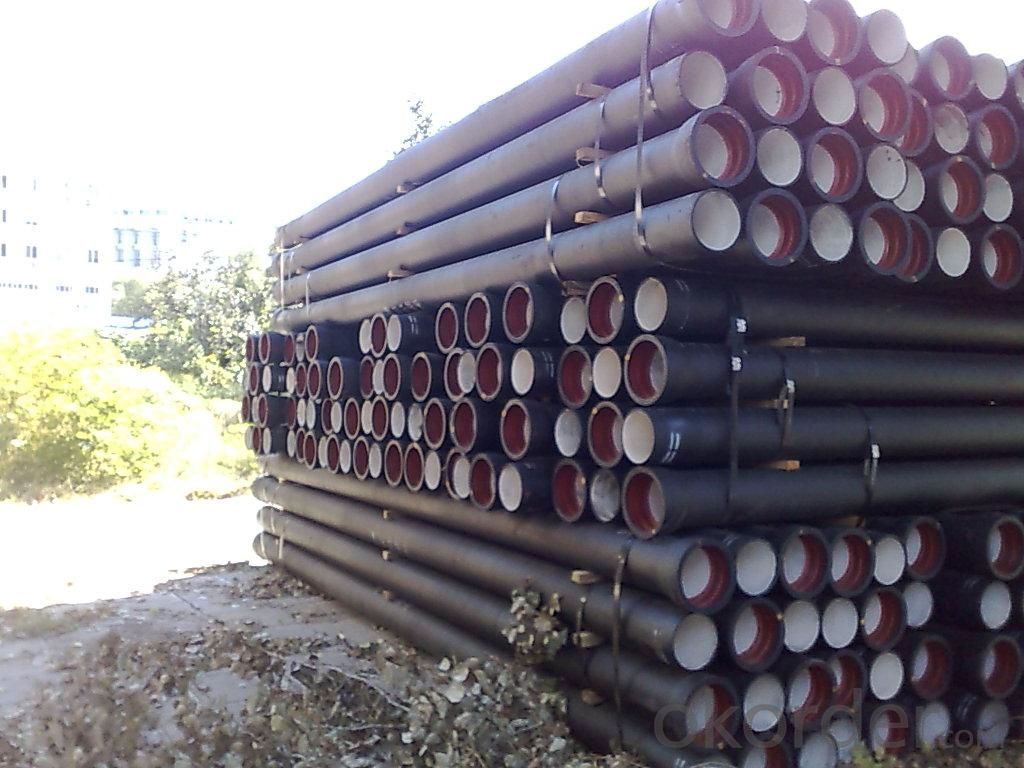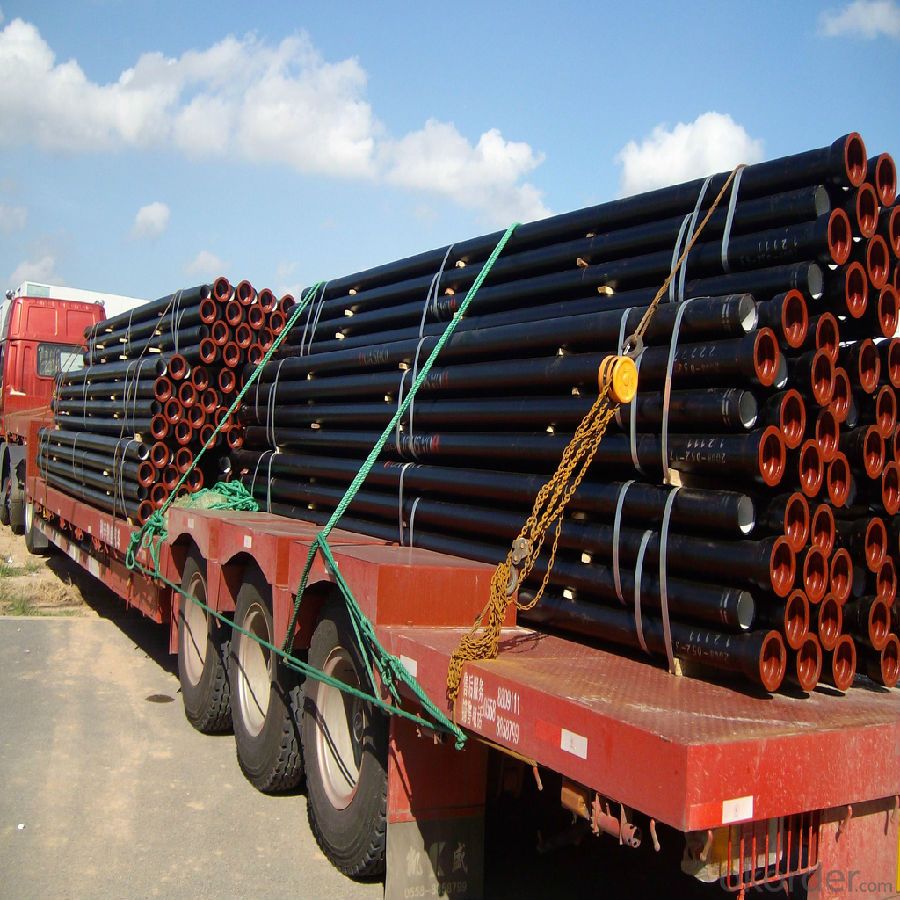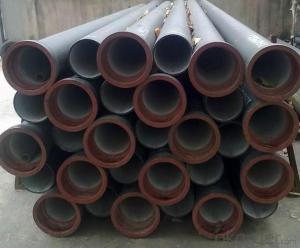Ductile Iron Pipe of China DN800 EN598 Hot Sale
- Loading Port:
- China main port
- Payment Terms:
- TT or LC
- Min Order Qty:
- 25 m.t.
- Supply Capability:
- 100000 m.t./month
OKorder Service Pledge
OKorder Financial Service
You Might Also Like
1,Ductile Iron Pipe Description :
1) Pipes confirm to ISO2531,K9 class,T type joint,6m long,with inside cements lining conform to ISO4179, outside Zinc spraying(130g/m2) and bitumen coating(70μm) conform to ISO8179.
2) Pipe ends: Spigot and socket ends, with 100% SBR rubber gaskets accoding to ISO4633
3) we can do third party inspection according to customer's request.
4) Our products have been sold to many international market, such as Middle East and South East Asia and Africa.
2,Main Features of the Ductile Iron Pipe:
•High yield strength
•High tensile Strength
•High corrosion resistance
•Pressure Resistence
•Anti-corrosion
•Installation is convenient
1).Packing and Shipping
• standard export package(carton/wooden case/pallet)
• accept FOB,FAS,CNF,CIF door to door etc or customer designated shipping agent
2).Service
• Drawing: we can translate your original drawing, offer best suggestion on design
• Quality: we have full set quality control system to guarantee the best quality.
• Inspection: inspect in house, all our products must be checked 3 times before packing
3)Inspection
• In-house Foundry
• Third party inspection available upon requirement
4) Our goal
• To be your preferred partner
3,Ductile Iron Pipe Images:


4. Ductile Iron Pipe Specification:
Standard: API SPEC 5L 44th eidtion,ASTM A252-98(2007)
Grade: A53 Grades A/B, ASTM A106 Grades B/C,ASTM A179
AWWA, C200, ASTM A139, ASTM A120, API 5L Grade B
X42, X52, X56, X60, X65, X70, X80, X100
Weld Alternatives: LSAW
OD size range: 6.4~44.5mm
Wall thickness: 406.4~1422mm
Length: 3 - 12 m according to requirment
Note: Other grade can also be provided after consulting. Special design are available
for coal slurry conveyance LSAW line tube -- Service
External coating: ductile iron pipes shall be externally coated with metallic zinc spray plus a further layer of resin painting to ISO8179.
Gasket: 100% SBR/NBR/EPDM rubber gasket in accordance with ISO4633.
Packing: ductile iron pipes from DN100 to DN300 be bundled with steel belts, others are in bulk.
Payment term: L/C, T/T.
Packing: In bulk vessel or in container
5.FAQ:
We have organized several common questions for our clients,may help you sincerely:
1.Q: Why would you choose ductile iron pipe rather than other pipe materials?
A:The reasons are obvious for that not only ductile iron pipe possesses the inherent strength and flexibility of ductile iron, combined with proven corrosion protection systems, but also the cost savings can be achieved from design to installation and commissioning.
2.Q:Why can you guarantee the inner of pipes can’t be corroded?
A: High alumina cement mortar lining and sulphate-resistant cement mortar lining. These two special linings are applicable to inner anti-corrosion for sewage pipes, improving resistance to erosion of the sewage components.
- Q:Are ductile iron pipes available in different wall thicknesses?
- Yes, ductile iron pipes are available in different wall thicknesses. Ductile iron pipes are manufactured with various wall thicknesses to meet different requirements and applications. The wall thickness of a ductile iron pipe is determined based on factors such as the pipe's diameter, the internal pressure it needs to withstand, and the soil conditions it will be installed in. Pipes with thicker walls are typically used for higher pressure applications or in areas with more challenging soil conditions, while thinner-walled pipes may be suitable for lower pressure applications. The availability of different wall thicknesses allows for flexibility in selecting the appropriate ductile iron pipe for specific projects and ensures that the pipes can efficiently and safely transport fluids or gases.
- Q:Ductile iron pipe is how many years warranty
- Ductile iron pipe warranty is unlimited.
- Q:What are the advantages and disadvantages of spheroidal graphite cast iron?
- Compared with cast iron, ductile iron has an absolute advantage in strength. The tensile strength of ductile iron is 60K, while the tensile strength of cast iron is only 31k. The yield strength of ductile iron is 40K, while the cast iron does not show yield strength, and eventually breaks. The strength to cost ratio of ductile iron is far superior to that of cast iron.
- Q:How are ductile iron pipes inspected for quality control?
- To guarantee compliance with industry standards, ductile iron pipes undergo a series of rigorous tests and inspections for quality control. Trained inspectors conduct visual inspections, carefully examining the pipes for visible defects like cracks, pits, or surface irregularities. This process aims to identify any visual flaws that could compromise the overall quality of the pipes. Dimensional inspection is another crucial quality control measure. Specialized tools and equipment are used to measure the pipes' dimensions, including diameter, wall thickness, and length. By comparing these measurements to specified tolerances, any deviations can be detected, and necessary corrective actions can be taken. Hydrostatic pressure testing is an important step in quality control. The pipes are subjected to internal pressure higher than their intended operating pressure to ensure they can withstand the required pressure without any leakage or failure. This test involves filling the pipes with water and gradually increasing the pressure while closely monitoring for any signs of leakage or deformation. Furthermore, mechanical tests such as tensile strength testing and impact testing are conducted to evaluate the pipes' mechanical properties. Controlled forces or impacts are applied to the pipes, and their response is measured. This allows for the assessment of the pipes' strength, toughness, and durability, ensuring they meet the necessary requirements. Metallurgical examinations are also carried out to analyze the microstructure of the ductile iron pipes. Samples are taken from the pipes, and microscopy techniques are used to examine the grain structure, phase distribution, and any potential defects at a microscopic level. This process helps identify any issues that may not be visible to the naked eye but could affect the overall quality of the pipes. Overall, the inspection process for ductile iron pipes encompasses a combination of visual, dimensional, hydrostatic, mechanical, and metallurgical tests. These quality control measures ensure that the pipes meet the required standards, providing reliable and durable infrastructure for various applications.
- Q:What is the DN400 installation charge for ductile iron pipes?
- Labor cost: refers to the total amount of wages according to the provisions of the payment to the construction and installation works in the production of workers and ancillary production units of workers costs.
- Q:What are the different types of coatings available for ductile iron pipe?
- Ductile iron pipe offers a range of coating options, each with its own unique properties and benefits. 1. One commonly used coating is cement mortar. It involves applying a layer of cement mortar to both the interior and exterior surfaces of the pipe. This coating protects against corrosion and abrasion, while also improving hydraulic efficiency. 2. Another popular choice is polyethylene encasement. This involves wrapping the pipe with a layer of polyethylene material. It provides excellent corrosion resistance, especially against soil and water contaminants. 3. Fusion-bonded epoxy (FBE) coating is applied by heating epoxy powder to create a strong bond with the pipe surface. It offers outstanding corrosion resistance and is commonly used in aggressive environments like wastewater treatment plants and chemical processing facilities. 4. Zinc coating, also known as galvanization, is applied by adding a layer of zinc to the pipe's surface. It provides excellent corrosion resistance and is often used in outdoor applications exposed to moisture and humidity. 5. Bituminous coating is a black, tar-like substance that protects against corrosion. It is commonly used in underground applications where the pipe is in contact with soil or water. 6. Polyurethane coatings are known for their resistance to abrasion, impact, and chemical corrosion. They are often used in aggressive environments such as oil and gas pipelines. These examples highlight the different coatings available for ductile iron pipe. The choice of coating depends on factors like the intended application, environmental conditions, and desired level of corrosion protection. It is crucial to consult industry experts and follow relevant standards and specifications when selecting a coating for ductile iron pipe.
- Q:How does ductile iron pipe compare to steel pipe in terms of durability?
- Ductile iron pipe and steel pipe both have their own unique characteristics, but in terms of durability, ductile iron pipe has several advantages over steel pipe. Firstly, ductile iron pipe is highly resistant to corrosion. It has a protective layer of zinc or cement lining that prevents rust and corrosion, making it more durable and less prone to leaks or failures. On the other hand, steel pipe is susceptible to corrosion, especially when exposed to moisture or certain chemicals. This can lead to structural issues and decrease its overall durability. Secondly, ductile iron pipe has excellent impact resistance. It can withstand heavy loads and external pressures without cracking or breaking. This makes it suitable for applications in areas with high traffic or where the pipe may be subject to accidental impacts. Steel pipe, although strong, can be more brittle and prone to fractures under similar conditions. Additionally, ductile iron pipe has a longer service life compared to steel pipe. It has been known to last for over 100 years with proper maintenance, making it a reliable and durable choice for infrastructure projects. Steel pipe, while still durable, may require more frequent inspections and maintenance to ensure its longevity. Overall, ductile iron pipe surpasses steel pipe in terms of durability due to its corrosion resistance, impact resistance, and longer service life. However, the choice between the two ultimately depends on the specific application, budget, and other project requirements.
- Q:Qianwei County ductile iron pipe which tool to use cutting convenience?
- Cutting the ductile iron pipe by grinding is grinding and cutting the ductile iron tube continuously by grinding wheel until it breaks. To cut ductile iron pipes by grinding cutting method, the cutting parts should be crossed at first so as to avoid deviation during cutting. Place the drawn ductile iron tube in the cutting machine and fix the ductile iron tube and clamp it with a built-in clamp. Next, start the cutting machine and gradually press the handle of the cutting machine. The grinding wheel cuts into the ductile iron tube until the ductile iron pipe is cut off. When exerting pressure on the handle, do not force too hard at once, otherwise it will cause the grinding wheel to break. In the operation of the machine, the operator must not stand on the side of the grinding wheel, so as to avoid accidents. When the wheel appears in cutting, vibration, shaking, uneven phenomenon, should immediately stop the operation, check whether there is the wheel gap, if damaged, must be promptly replaced, to ensure safety and normal. Good cutting ductile cast iron pipe section, if there is to prevent the use of burrs, can be removed by grinding or machining file.
- Q:Can ductile iron pipes be used for underground wastewater outfalls?
- Yes, ductile iron pipes can be used for underground wastewater outfalls. Ductile iron pipes are a popular choice for underground applications due to their durability, strength, and corrosion resistance. They are designed to withstand high pressure and external loading, making them suitable for transporting wastewater over long distances and depths. Additionally, ductile iron pipes have a smooth internal surface, which helps to minimize friction and prevent the buildup of sediments or debris that could potentially block the flow of wastewater. Therefore, ductile iron pipes are commonly used in underground wastewater systems, including outfalls, to ensure efficient and reliable wastewater transport while minimizing the risk of pipe failure or blockages.
- Q:Can ductile iron pipes be used in agricultural applications?
- Ductile iron pipes are indeed suitable for agricultural applications. They possess exceptional strength and durability, rendering them appropriate for a range of agricultural purposes. These pipes find utility in irrigation systems, water supply pipelines, and drainage systems within farms and agricultural fields. Given their resistance to corrosion and long lifespan, ductile iron pipes are essential for agricultural applications that involve exposure to various environmental factors and chemicals. Moreover, the pipes' ability to withstand high-pressure water flow makes them ideal for transporting water for irrigation purposes. In summary, ductile iron pipes are a dependable and efficient choice for agricultural applications due to their strength, durability, resistance to corrosion, and capacity to handle high-pressure water flow.
1. Manufacturer Overview |
|
|---|---|
| Location | |
| Year Established | |
| Annual Output Value | |
| Main Markets | |
| Company Certifications | |
2. Manufacturer Certificates |
|
|---|---|
| a) Certification Name | |
| Range | |
| Reference | |
| Validity Period | |
3. Manufacturer Capability |
|
|---|---|
| a)Trade Capacity | |
| Nearest Port | |
| Export Percentage | |
| No.of Employees in Trade Department | |
| Language Spoken: | |
| b)Factory Information | |
| Factory Size: | |
| No. of Production Lines | |
| Contract Manufacturing | |
| Product Price Range | |
Send your message to us
Ductile Iron Pipe of China DN800 EN598 Hot Sale
- Loading Port:
- China main port
- Payment Terms:
- TT or LC
- Min Order Qty:
- 25 m.t.
- Supply Capability:
- 100000 m.t./month
OKorder Service Pledge
OKorder Financial Service
Similar products
New products
Hot products
Related keywords



























